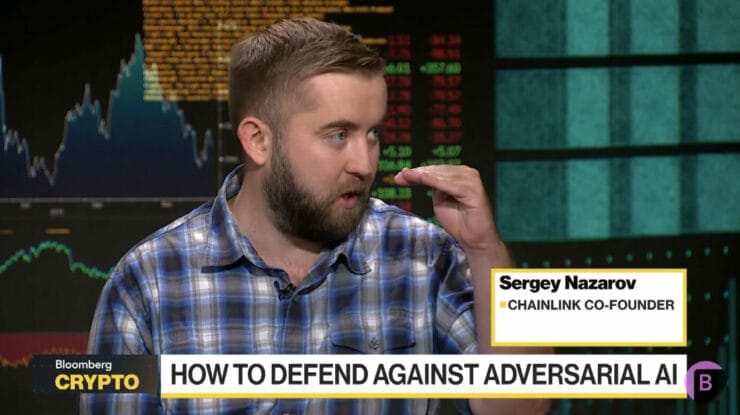Last month, after more than 2,600 tech industry leaders petitioned to temporarily pause AI development, Chainlink co-founder Sergey Nazarov penned an argument for prioritizing blockchain technology as society’s best defense against adversarial AI.
“The question is not whether we should slow down the development of AI, that ship has likely sailed,” he wrote. “The key question now is how key parts of our society can become AI resistant.”
In an interview with Nathaniel Whittemore on The Breakdown podcast, Nazarov advocated for AI-resistant systems built with decentralized technologies, such as blockchains and oracle networks, that safeguard against single points of failure by means of consensus.
“The reason why consensus has better security properties is because instead of having one entity to compromise, you have tens or hundreds or thousands of entities,” he explained.
Yesterday, Nazarov appeared on Bloomberg Crypto with hosts Kailey Leinz and Matt Miller to further distill how blockchain technology can be used to fortify global finance against the misuse or misalignment of increasingly sophisticated AI systems.
“Blockchains have had to meet a very high standard for security and this is the sense in which I feel they are more AI-resistant,” he said.
Reiterating his belief that pausing AI development at this point is “unlikely,” Nazarov said the focus should expand beyond prevention to protection.
“I think what we should be thinking about is countermeasures and how can systems be made AI-resistant, so that if people do use AI or if an AI becomes adversarial, how do you limit what it’s able to do by building systems that are resistant and secure against that adversary?”
According to Nazarov, blockchain’s fundamental security feature – decentralization – is resistant to adversarial AI for the same reason it has proven resistant to the spectrum of human adversaries. Put simply, an entity’s resilience corresponds to the number of points an adversary must compromise to breach the entire entity.
“If you need to compromise a single server in a single bank, that’s one system; but to compromise something like Bitcoin or Ethereum, you need to compromise thousands of servers,” he said.
“And so, presumably, if an AI were to try to hack a single bank server versus Bitcoin, it would be much harder for it to hack Bitcoin. And in that sense, those systems would be AI-resistant.”
For those who doubt the likelihood of a global shift toward blockchain-based systems, Nazarov highlighted the hesitancy once associated with now ubiquitous technology like the internet and even automobiles.
“In the early days of various technologies, they’re often misunderstood,” he said. “And now we all drive around in cars and we all use the internet. I think there’s a lot of value that blockchains provide to society. And at the end of the day, that’s what regulation and society will realize.”
Watch Sergey Nazarov’s full interview on Bloomberg Crypto.


